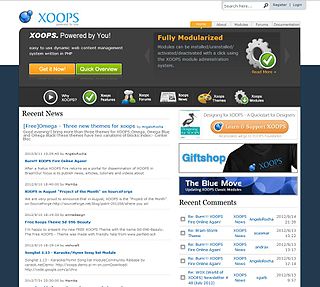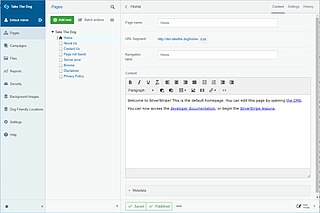
Drupal is a free and open-source web content management system (CMS) written in PHP and distributed under the GNU General Public License. Drupal provides an open-source back-end framework for at least 14% of the top 10,000 websites worldwide and 1.2% of the top 10 million websites—ranging from personal blogs to corporate, political, and government sites. Drupal can also be used for knowledge management and for business collaboration.

Movable Type is a weblog publishing system developed by the company Six Apart. It was publicly announced on September 3, 2001; version 1.0 was publicly released on October 8, 2001. The current version is 8.0.

WordPress is a web content management system. It was originally created as a tool to publish blogs but has evolved to support publishing other web content, including more traditional websites, mailing lists and Internet forum, media galleries, membership sites, learning management systems and online stores. Available as free and open-source software, WordPress is among the most popular content management systems – it was used by 43.1% of the top 10 million websites as of December 2023.

XOOPS is a free open-source content management system (CMS), written in PHP. It uses a modular architecture allowing users to customize, update and theme their websites. XOOPS is released under the terms of the GNU General Public License (GPL) and is free to use, modify and redistribute.
The following tables compare general and technical information for many wiki software packages.

Django is a free and open-source, Python-based web framework that runs on a web server. It follows the model–template–views (MTV) architectural pattern. It is maintained by the Django Software Foundation (DSF), an independent organization established in the US as a 501(c)(3) non-profit.

Silverstripe CMS is a free and open source content management system (CMS) and framework for creating and maintaining websites and web applications. It provides an out of the box web-based administration panel that enables users to make modifications to parts of the website, which includes a WYSIWYG website editor. The core of the software is Silverstripe Framework, a PHP Web application framework.
LimeSurvey is a free and open source online statistical survey web app written in PHP using a MySQL, SQLite, PostgreSQL or MSSQL database, distributed under the GNU General Public License. Its web interface enables users to develop and publish online surveys, collect responses, review statistics, and export the resulting data to other applications.

MODX is an open source content management system and web application framework for publishing content on the World Wide Web and intranets. MODX is licensed under the GPL, is written in the PHP programming language, and supports MySQL, MariaDB and Percona Server as the database. It was awarded Packt Publishing's Most Promising Open Source Content Management System in 2007.

Habari was a free and open source blog engine written in PHP and currently supports MySQL, SQLite and PostgreSQL for the database backend. It got its name from the Swahili greeting habari, which means "(what's the) news".

TYPO3 is a Web Content management system (CMS) written in the programming language PHP. It can run on a variety of web servers, such as Apache, Nginx, or Internet Information Services (IIS), and on many operating systems, including Linux, Microsoft Windows, FreeBSD, macOS, and OS/2. It is free and open-source software released under the GNU General Public License version 2.
Phire CMS is an open source content management system and publishing platform for managing the content of websites and web applications. Phire CMS is licensed under the new BSD license, is written using the MySQL database and the PHP programming language.
ProcessWire is a free and open source content management system (CMS), content management framework (CMF) and web application framework (WAF) written in the PHP programming language. It is distributed under the Mozilla Public License 2.0. ProcessWire is built around an API with usage and naming conventions similar to the JavaScript framework jQuery. The stated goal behind the API is to provide the level of accessibility and control to pages in a website that jQuery provides to the DOM. Content is managed either via the API or the web-based admin control panel. ProcessWire is largely used for development of web sites, web applications, services, content feeds and related applications.
Softaculous is a commercial script library that automates the installation of commercial and open source web applications to a website. Softaculous scripts are executed from the administration area of a website control panel, typically via an interface tool such as cPanel, Plesk, DirectAdmin and InterWorx. Softaculous applications typically create tables in a database, install software, adjust permissions, and modify web server configuration files.
AMPPS is a solution stack of Apache, MySQL, MongoDB, PHP, Perl and Python for Windows NT, Linux and macOS. It comes with 419 PHP web applications, over 1000 PHP classes and 6 versions of PHP. AMPPS is created by Softaculous Ltd. a company founded in 2009 which makes the Softaculous Auto installer. AMPPS is used to develop on PHP, MySQL applications like WordPress, Joomla, and Drupal.

Jamroom is a community focused open source software web content management system (CMS) and Framework based on PHP, and MySQL, MariaDB or Percona Server which runs on a web hosting service. Features include a module based extension system and skins using the Smarty templating engine. Jamroom is distributed under the open source Mozilla Public License (MPL)
Magnolia is an open-source content management system (CMS). It is developed by Magnolia International Ltd., based in Basel, Switzerland. It is based on Content repository API for Java.
Composr CMS is a web application for creating websites. It is a combination of a Web content management system and Online community software. Composr is licensed as free software and primarily written in the PHP programming language.
PHP-Fusion is a free and open-source web framework based on PHP and MySQL that has an integrated content management system (CMS) among many other features.










